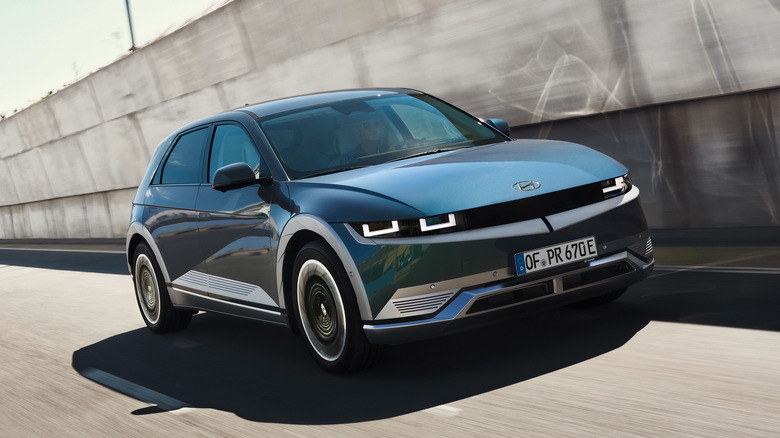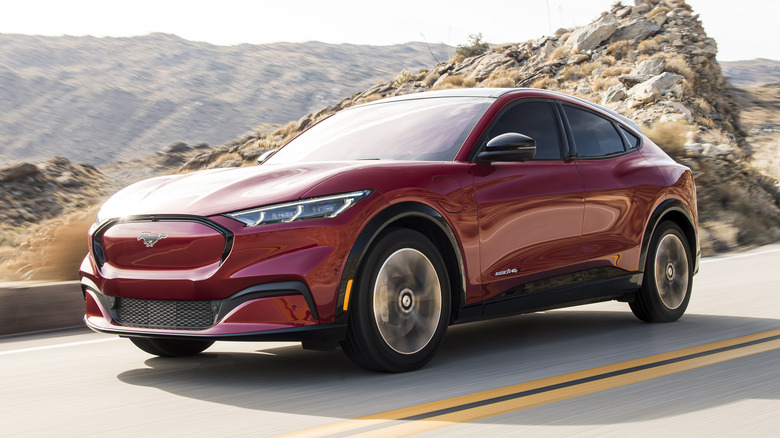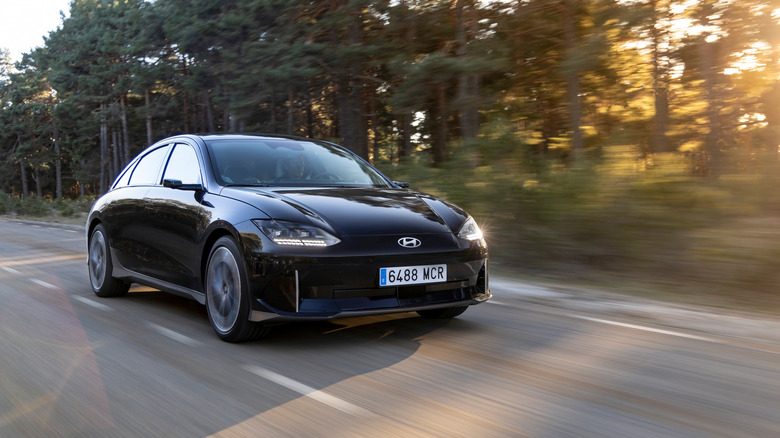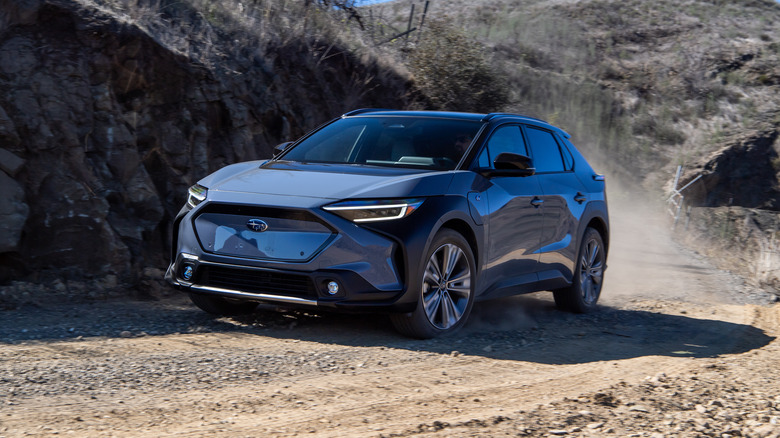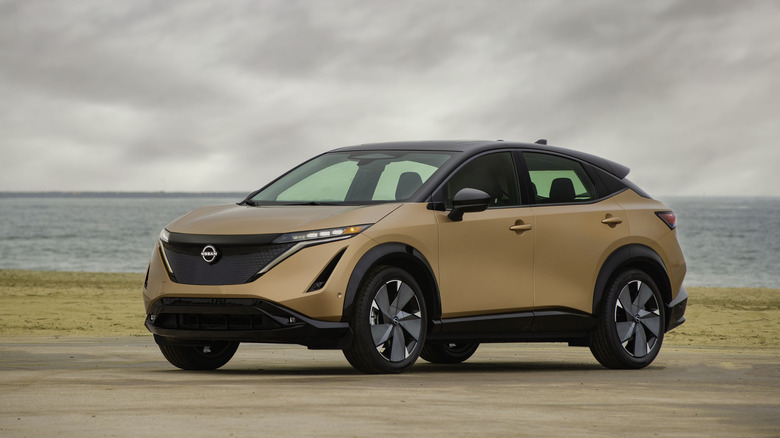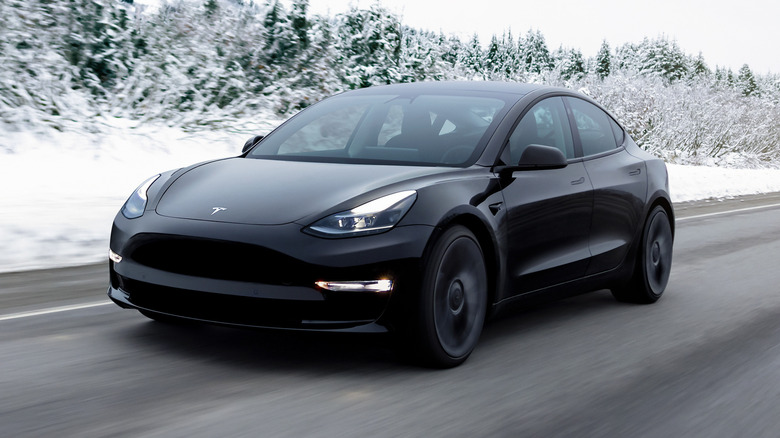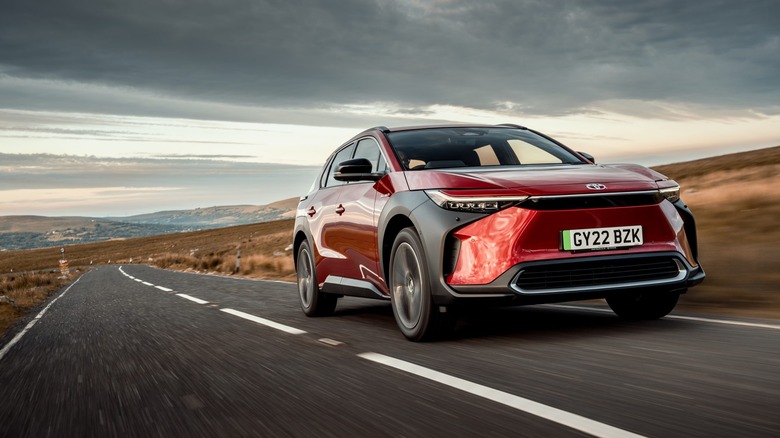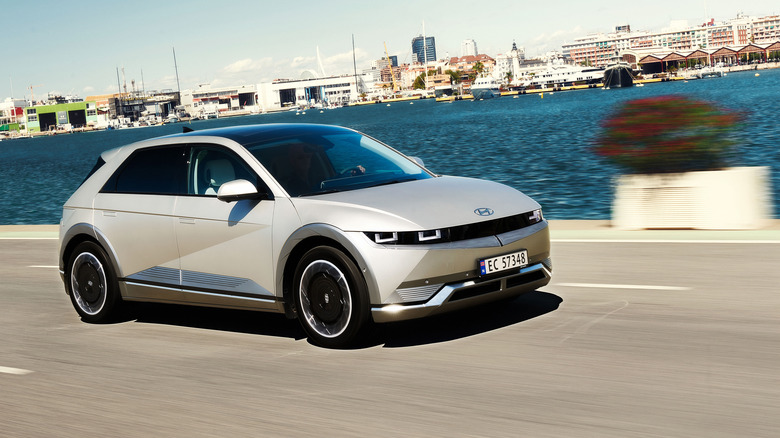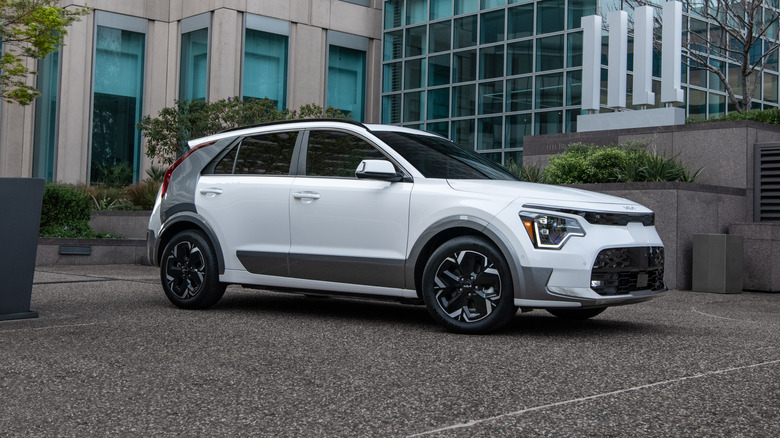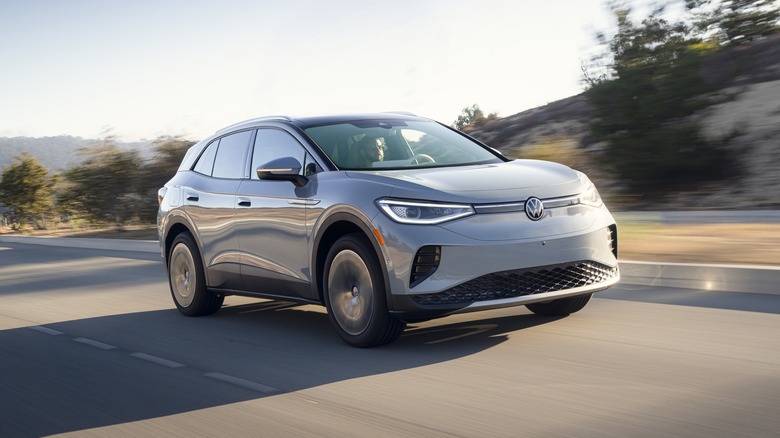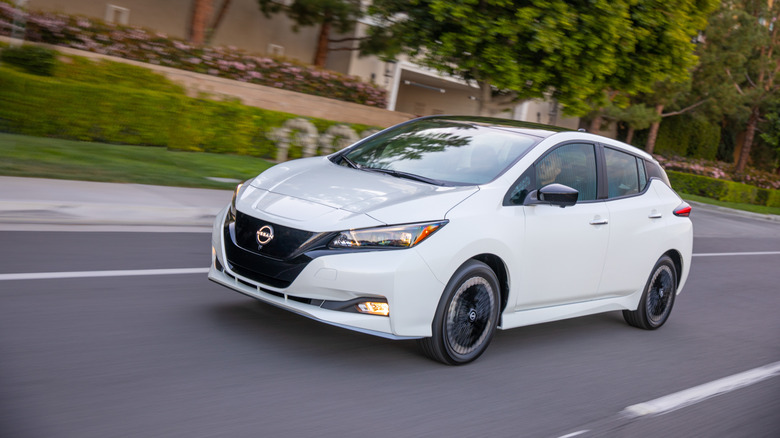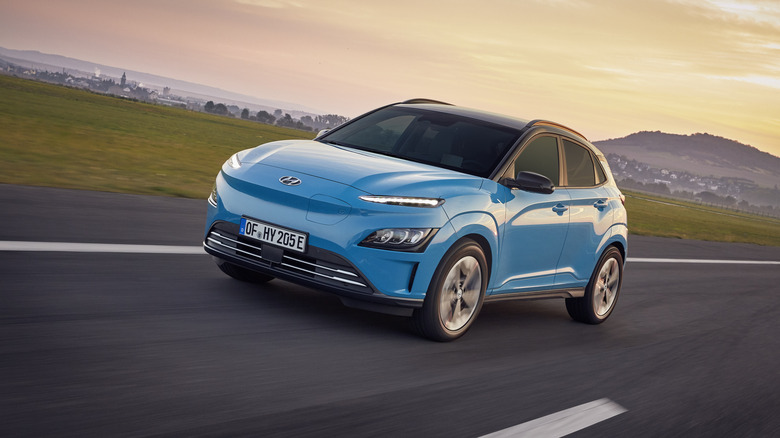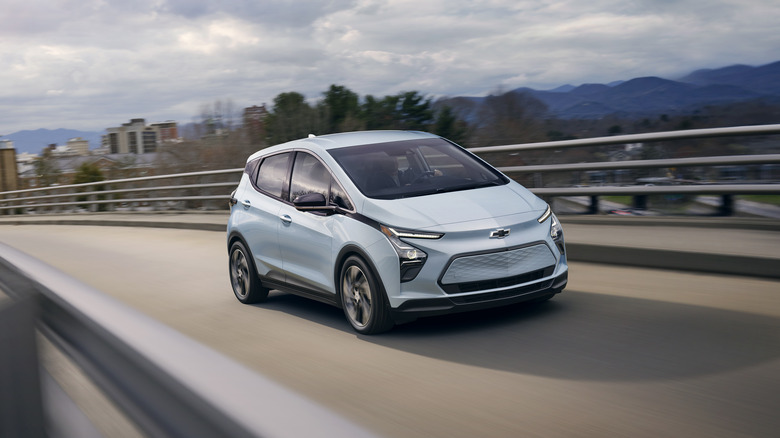The 12 Cheapest Electric Cars That Also Have Good Range
EV adoption is on the rise, with a report from the Edison Electric Institute suggesting that nearly 10% of all cars on American roads will be electric by 2030. Despite this increase in ownership, there are still plenty of barriers that stop many potential owners from making the switch to electric, and two of the biggest of those are upfront cost and battery range. It's no secret that Battery Electric Vehicles (BEVs) are generally more expensive to buy than their gas-powered counterparts, but the expanding number of manufacturers now offering EVs has helped increase competition and drive those prices down a bit.
As for the latter issue, most new EVs pack enough range that running out of juice won't be a concern for day-to-day driving. For the purposes of this list, we've defined "good range" as having an EPA-estimated range of 200 miles or more, but the most long-range cars on the market can go well over 300 miles on a single charge. Every EV here also costs less to buy than the average price of a new car, which sat at $48,763 in February 2023.
Ford Mustang Mach-E (247 miles, $45,995)
Adding the iconic Mustang nameplate to an electric crossover SUV would always be a controversial decision, but Ford's flagship performance EV has proven itself to be a generally impressive machine. SlashGeardrove the 2023 model and found it felt somewhere between a regular crossover and a Mustang coupe to drive, with a firmer ride and faster acceleration than most other cars in its class, but still short of the dynamic capabilities of its gas-powered badge sibling.
With 247 miles of range available with the base-spec RWD car, the Mustang Mach-E can't compete with the best in the segment, but it's decent nonetheless. The Tesla-esque large central touchscreen might put off some buyers, but all the car's important functions are easy enough to find thanks to Ford's SYNC 4A infotainment system. A Mustang badge on a car like this will always rile up some enthusiasts, but look past Ford's headline-grabbing branding choices and you'll find a competent and likable EV. Buyers looking for the cheapest car versions might have to wait a while, as Ford has temporarily frozen base-spec factory orders to concentrate on fulfilling orders for higher-spec variants of the car.
Hyundai Ioniq 6 (361 miles, $45,500)
Tesla has led the way in the EV space for range and charging times for years now, but Hyundai's recently unveiled Ioniq 6 should give the American automaker some pause for thought. For a starting price of around $46,000 when destination fees are considered, buyers get a car with an EPA-estimated 361 miles of range, a fraction more than the 358 miles of range on offer with a Model 3 Long Range AWD.
The base-spec Ioniq 6 SE is, confusingly, not actually the cheapest version of the car either, as Hyundai is offering an "SE Standard Range" variant with 240 miles of range for $41,600. However, this model will only be available in "extremely limited quantities," per the brand's website, and orders will open in the summer of 2023. If you want one now, the 361-mile SE is the most affordable option, and it's a great option. At this price point, you won't find an EV with more range, although we haven't had the chance to drive the car ourselves yet, so we don't know how accurate the EPA figure is.
Subaru Solterra (228 miles, $44,995)
Developed in partnership with Toyota, the 2023 Solterra is Subaru's first foray into the world of BEVs. As you'd expect from a Subaru, it features all-wheel drive, a suite of safety features, and 8.3 inches of ground clearance for rougher terrain. The range for all trims is rated at 228 miles, and Subaru claims it'll take about an hour to charge the car from 0-80% at a fast-charging station. The Solterra positions itself as one of the first off-road-focused EVs in its price bracket, with dedicated modes for snow/dirt and deep snow/mud.
228 miles isn't groundbreaking, and the $45k price tag is hardly a bargain considering what's on offer across the rest of the market. However, the similarly off-road-oriented Subaru Forester has proven itself to be a consistently strong seller, with over 100,000 units sold every year for the last decade. If the Solterra can win over even a fraction of those buyers and draw some new faces to the Subaru brand simultaneously, then it stands a good chance in the increasingly competitive EV space.
Nissan Ariya (215 miles, $43,190)
While some EVs go all out to dazzle buyers with their unique designs and futuristic features, the Nissan Ariya is a little different. In fact, it's a great option for first-time EV buyers, since Nissan has made a conscious effort to make it as familiar as possible to anyone who previously had a gas burner as their daily driver. EV-specific features like full one-pedal driving and emergency home backup power are off the table, with Nissan instead opting to focus on making the car quiet, intuitive, and generally as easy to live with as possible.
The base-spec car's range of 215 miles won't satisfy anyone looking for the cutting edge of EV range, but as an everyday family hauler it'll do just nicely. There's also an extended range 304 mile version of the Ariya available, although you'll have to pay at least $4,000 more for the privilege.
Tesla Model 3 (272 miles, $42,990)
The Model 3 is the most affordable car in Tesla's current lineup, yet like all modern Teslas, its range is impressive. In its cheapest form, the Model 3 boasts 272 miles of EPA-estimated range, with a 0-60 mph time of just 5.8 seconds. If the rumors are to be believed, a new Model 3 will be on the way shortly, with a number of changes including revised front and rear bumpers, headlight tweaks, and a redesigned cabin.
Leaks also suggest that the exterior temperature sensor will be removed in the name of cost-cutting, with improvements made to the car's GPS module to provide more accurate ambient weather data from a third-party source instead. The new Model 3 is claimed to be reaching production in the third quarter of 2023, but until then, the current-gen car remains a very attractive choice for anyone shopping for a new EV.
Toyota bZ4x (252 miles, $42,000)
The other half of the "Toyobaru" EV twins, the Toyota bZ4x is the Japanese automaker's long-awaited first series-production BEV. It sports a similarly divisive look to the Subaru Solterra with which is shares its platform, but its noteworthy styling is one of the few standout features of the car. It's "just fine" in almost every other aspect, with unremarkable driving dynamics, a good (but not exceptional) range, and a decent price point.
The cabin is generally well designed, but there are a few notable annoyances. The digital gauge cluster is placed further back than the central infotainment touchscreen, and we found going between the two to be a strain on the eyes. For some reason, Toyota also positioned the gauges in a way that they can be easily obscured by the steering wheel depending on your driving position, so to even see them, you'll need to move slightly from where you'd naturally want to sit. The drive select knob is also unintuitive, with an odd design that can feel a bit clunky to operate at first. These are, of course, all minor annoyances, and in general the bZ4x is an approachable, inoffensive car to drive. We just wish it stood out a bit more in the face of such fierce competition.
Hyundai Ioniq 5 (220 miles, $41,450)
The innovative Hyundai Ioniq 5 debuted for the 2022 model year, and for 2023, it's carried over with only minimal changes. A battery heating system now comes as standard on all trims, and battery preconditioning is enabled when you input a fast charging point into the onboard navigation system. Pretty much everything else is the same as before, which means the SE Standard Range model is capable of 220 miles of range with a starting MSRP of $41,450 excluding fees.
The exterior styling is an eye-catching mix of retro and modern, while inside, the focus is much more firmly on the latter. A pair of 12-inch touchscreens provide the instrument cluster and infotainment system, with both arranged in parallel to keep the interior looking as sleek as possible. Hyundai has also focused on sustainability with regards to the interior, and much of the cabin finish is made from recycled plastic, sustainably processed leather, and wool.
Kia Niro EV (253 miles, $39,550)
Unlike many current-gen EVs that are specifically designed as BEVs, the 2023 Kia Niro is available with a choice of three drivetrains: hybrid, plug-in hybrid, or pure electric. The all-electric version delivers 201 horsepower from a single motor and claims 253 miles of range. The exterior design is fairly standard EV fare, although the stretched contrast D-pillar gives it a bit of a unique flair that isn't present in its rivals.
Stepping inside the car, SlashGear found it to be very well equipped for its price bracket, with design cues that echo Kia's more expensive models even if some of the materials feel a little cheaper. The infotainment system is easy to navigate, and dual-zone climate control is available on all trims, which is a nice touch. All in all, the Niro EV delivers a very convincing near-premium experience, even though its price squeaks in just under the $40,000 mark.
VW ID.4 (209 miles, $38,995)
The VW ID.4 has been on the market for a couple of years now, but the 2023 model sees it cut to its cheapest-ever price. A new, lower-tier "ID.4 Standard" variant is now available, with 209 miles of range on offer. The "Standard" might be slightly cheaper, but it's the mid-tier "ID.4 Pro" that's arguably the better value, as for around $5,000 more you get an extended 275 miles of EPA-estimated range, putting the ID.4 on par with offerings from the likes of Tesla and Kia.
The base-spec 2023 model also sees the introduction of the first U.S.-built ID.4 models, with VW's plant at Chattanooga churning them out alongside higher trim variants, which are still built in Germany. SlashGear'stest drive of the American-made ID.4 proved it felt largely the same as the German version in terms of acceleration and driving dynamics, despite its smaller battery. VW is banking on the EV selling large volumes to spearhead its transition into the world of electric vehicles, and the initial results look promising, with around 170,000 units of the car delivered globally in 2022.
Nissan Leaf SV Plus (212 miles, $36,040)
The Nissan Leaf is a landmark car that was once the best-selling EV in the world, although in 2023, it's starting to show its age. The current generation of the car debuted in 2018, and other rivals like the Chevrolet Bolt EUV now arguably provide better value for money. The base-spec Nissan Leaf starts at less than $30,000, but its sub-200 mile range means it doesn't qualify for this list. The top-spec SV Plus does though, with a larger 60kWh battery providing up to 212 miles of juice on a single charge.
At a starting MSRP of $36,040, the Leaf SV Plus now has a lot of competition in the same price bracket, many of whom offer more range, equipment, or better driving dynamics. However, if you're looking for a fuss-free, proven BEV, don't count it out just yet. The enduring popularity of the Leaf means it's also one of the easiest EVs to find used, and there are significant discounts to be had if you can find one that's a few years old and in good condition.
Hyundai Kona Electric (258 miles, $33,550)
Much like the Kia Niro, the Hyundai Kona is available in a range of both electric and non-electric flavors. The recently revealed 2024 Kona EV debuts a new exterior design and improved range, but it isn't available to order until late 2023. At present, buyers will have to stick with the 2023 Kona EV, which still offers great value for money, at least on paper. It starts at $33,550 excluding fees and taxes, and every trim gets 258 miles of range according to the EPA.
A 201 horsepower single motor is also standard, which is shared with the Kia Niro. It all seems very competitive, but the Kona's reliability record is a different story. In fact, it's one of the least reliable electric cars you can buy today, with an alarming number of reports of battery or motor failures. These are all covered by Hyundai's generous warranty, but it's probably better to not take the risk at all until these issues are fixed. It's worth noting here that Hyundai's other EVs, like the Ioniq 5, get much better reliability ratings.
Chevrolet Bolt EV/EUV (259 miles, $27,495)
The 2023 Chevy Bolt EV is not only one of the cheapest electric vehicles on the market, but it's also surprisingly capable, with 259 miles of range available on base-spec versions. It starts at around $27,500 including destination charges, and comes well-equipped for such a low price. A 10.2-inch touchscreen displays infotainment, with Apple CarPlay and Android Auto available as standard. Standard safety features include lane departure warning, lane keep assist, and forward collision alert, not the most comprehensive of any EV but good considering the price.
If the Bolt EV seems a little too small, then the slightly larger Bolt EUV offers more room in the cabin, GM's SuperCruise semi-autonomous tech, and a sunroof. Range marginally decreases to a still-respectable 247 miles and price increases to $28,795 including destination charge. There simply isn't another sub-$30k EV on the market with such an impressive range, making the Bolt a great deal if you're a budget-conscious buyer looking to make the switch to electric.
